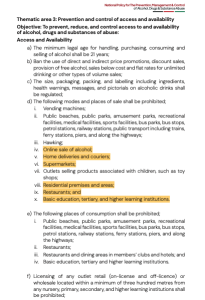News
NACADA Bans Sale of Alcohol in Supermarkets, Restaurants, Online, and Other Areas

The National Authority for the Campaign Against Alcohol and Drug Abuse (NACADA) has announced comprehensive new regulations that will fundamentally reshape how alcohol is sold and consumed in Kenya, introducing some of the most restrictive liquor policies in the region.
The new directives, effective immediately, prohibit the sale of alcoholic beverages in supermarkets, restaurants, and through online platforms, marking a dramatic shift from current retail practices.
The ban extends to home delivery services, which had become increasingly popular among urban consumers, particularly during and after the COVID-19 pandemic.
Under the new regulations, alcohol can no longer be sold through vending machines, at public venues including beaches, parks, amusement facilities, medical centers, sports complexes, bus stations, petrol stations, railway terminals, and along highways.
The authorities have also banned hawking of alcoholic products and sales in residential areas.
Educational institutions at all levels, from basic education through tertiary and higher learning institutions, are explicitly included in the prohibited zones.
Additionally, outlets that sell children’s products, such as toy shops, are now forbidden from retailing alcoholic beverages.
The policy introduces a significant change to Kenya’s legal drinking age, raising it from 18 to 21 years.
This adjustment aligns Kenya with countries like the United States while departing from the practice in many African nations.
The new age restriction also prohibits anyone under 21 from entering alcohol-selling establishments, regardless of whether they are accompanied by adults.
In a move targeting modern marketing practices, the regulations prohibit social media influencers, celebrities, entertainment personalities, sports figures, and media personalities from endorsing, promoting, or advertising alcohol, drugs, and other controlled substances.
This restriction reflects growing global concerns about the influence of social media marketing on youth consumption patterns.
The sweeping nature of these restrictions suggests a significant policy shift toward public health priorities, potentially reflecting government concerns about alcohol-related social problems and health issues.
Implications
However, the implementation of these measures is likely to face substantial resistance from various stakeholders, including retailers, hospitality businesses, and consumers.
Supermarket chains, which have traditionally been major alcohol retailers, will need to restructure their business models and potentially face revenue losses.
Restaurants and hotels may similarly experience reduced profit margins, as alcohol sales typically carry higher markups than food items.
The online alcohol delivery sector, which had experienced substantial growth in urban areas like Nairobi, Mombasa, and Kisumu, faces complete elimination under these new rules.
This will particularly impact tech-enabled platforms that had built their business models around convenient alcohol delivery services.
For consumers, particularly in urban areas where supermarket shopping and home delivery had become routine, these changes will require significant behavioral adjustments.
The restrictions may drive alcohol sales toward traditional bars and licensed establishments, potentially increasing costs for consumers and reducing convenience.
The enforcement of these regulations will likely require substantial government resources and coordination between NACADA, local authorities, and law enforcement agencies.
Questions remain about how effectively these widespread restrictions can be monitored and enforced across Kenya’s diverse retail landscape.
Industry observers suggest these measures may face legal challenges from affected businesses and could potentially impact government tax revenues from alcohol sales.
The hospitality and retail sectors are expected to lobby for modifications to the regulations, particularly regarding restaurant sales and the complete ban on supermarket alcohol retail.
The timing of these announcements coincides with broader government initiatives aimed at addressing substance abuse and promoting public health, indicating that alcohol regulation has become a priority for Kenyan policymakers as they balance economic interests with social welfare concerns.
Kenya Insights allows guest blogging, if you want to be published on Kenya’s most authoritative and accurate blog, have an expose, news TIPS, story angles, human interest stories, drop us an email on [email protected] or via Telegram
-

 Business2 weeks ago
Business2 weeks agoEastleigh Businessman Accused of Sh296 Million Theft, Money Laundering Scandal
-

 Investigations1 week ago
Investigations1 week agoInside Nairobi Firm Used To Launder Millions From Minnesota Sh39 Billion Fraud
-

 Business1 week ago
Business1 week agoMost Safaricom Customers Feel They’re Being Conned By Their Billing System
-

 News1 week ago
News1 week agoUnfit for Office: The Damning Case Against NCA Boss Maurice Akech as Bodies Pile Up
-

 Business2 weeks ago
Business2 weeks agoEXPLOSIVE: BBS Mall Owner Wants Gachagua Reprimanded After Linking Him To Money Laundering, Minnesota Fraud
-

 News1 week ago
News1 week agoTax Payers Could Lose Millions in KWS Sh710 Insurance Tender Scam As Rot in The Agency Gets Exposed Further
-

 News1 week ago
News1 week agoPastor James Irungu Collapses After 79 Hours Into 80-Hour Tree-Hugging Challenge, Rushed to Hospital
-

 News1 week ago
News1 week agoDeath Traps: Nairobi Sitting on a Time Bomb as 85 Per Cent of Buildings Risk Collapse


















